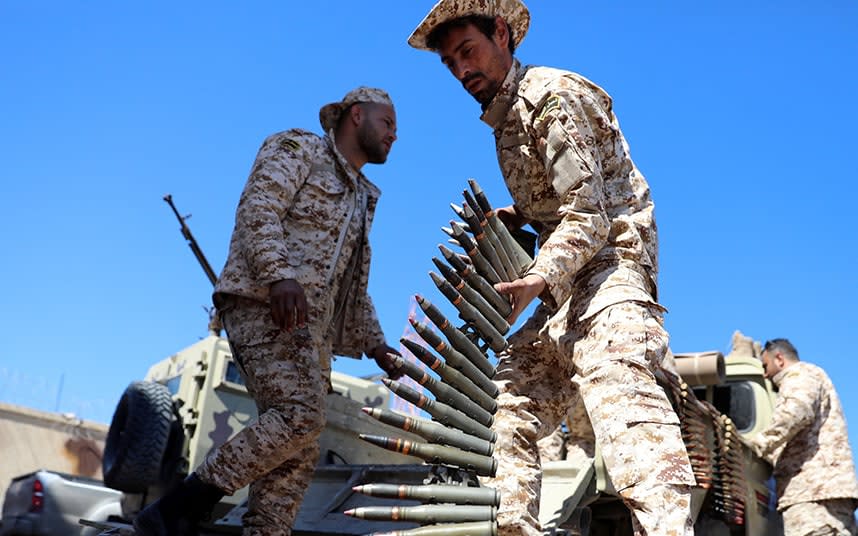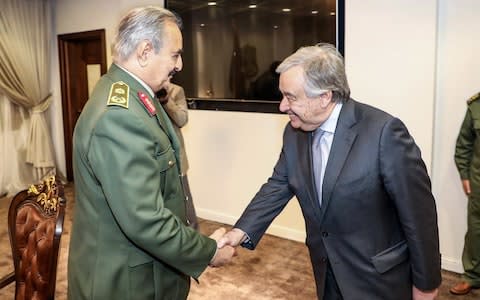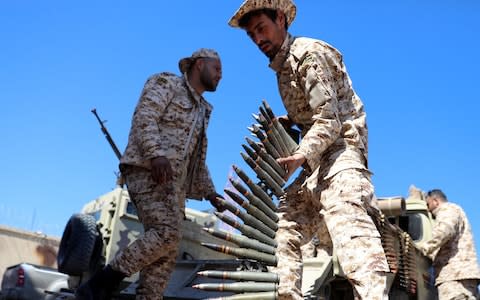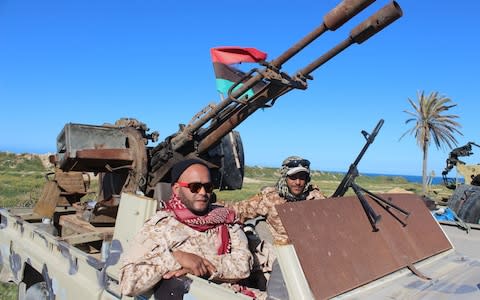Libya fighting escalates as Khalifa Haftar's forces bomb Tripoli airport

Fighting for control of the Libyan capital escalated dramatically on Monday when rebel forces loyal to Khalifa Haftar carried out an airstrike on city's only operating airport.
The attack came amid reports that the internationally recognised government of National Accord led by Fayyez al-Sarraj had begun conscripting migrants held in detention centres to fight against Gen Haftar's troops.
At least one jet was seen firing rockets at the Mitiga airport in northern Tripoli on Monday afternoon. The airport said it would be closed for the foreseeable future.
No casualties were reported. At least 2,800 people have been displaced since Gen Haftar’s self-styled Libyan National Army launched an assault on Tripoli last week.
The LNA said on Monday that 19 of its soldiers had been killed in recent days. The Tripoli based health ministry, on the government side, said at least 25 people including fighters and civilians had been killed and 80 wounded in fighting to the south of the capital.
The World Health Organization (WHO), the United Nations' health agency, said two doctors had been killed while treating civilians and trying to evacuate patients from combat zones in the city.
Ahmed Al Mandhari, the WHO's regional director for the eastern Mediterranean, said in a statement Monday that the targeting of doctors was "unacceptable."
Gen Haftar announced his assault on Thursday, citing the need to clear the city of "terrorists".
Tracking progress on the ground is difficult partly because both sides are made up of loose alliances of militia groups rather than professional armies. But despite clashes in the southern suburbs, the LNA advance appears to have made little progress.
Residents said LNA troops retreated from the former international airport, 15 miles south of the city centre, on Monday.
Analysts say Gen Haftar’s assault has compelled the disparate militia groups who control western Libya to band together, presenting a harder target than he may have anticipated.
“He created that alliance by going in to early, too strong,” said Jalel Harchaoui, a research fellow at the Clingdendael Institute, a think tank.

“It prompted potential opponents who were considering siding with Haftar to do an about face and fight him.”
Mr Harchaoui warned that the international community appeared to have little if any diplomatic leverage to reign in the fighting and that the situation could “worsen dramatically.”
“If the airstrikes continue escalating, you could see the two camps committed in a very blind manner to saving face, and that means a lot of destruction,” he said.
Meanwhile reports emerged that the internationally recognised government is offering migrants held in detention centres their freedom in exchange for military service.

Thousands of asylum seekers, many of them sub-Saharan Africans, are stuck in detention centres along the coast around Tripoli, hoping to cross the Mediterranean to Europe.
Many did national service in their own countries. “Reports of some Sudanese being released, given military uniforms and told that they may have to fight,” Vincent Cochetel, special envoy of the UNHCR for the central Mediterranean, wrote on Twitter.
He also said that the situation for asylum seekers in Libya is becoming increasingly desperate as fighting escalates between the two sides.

“Unverifiable reports received suggesting that no more food is reaching some detention centres in Libya, where refugees and militants are kept arbitrarily,” Mr Cochetel said.
Medicins San Frontieres, an NGO, said the fighting has left refugees and migrants in detention centres "exceptionally vulnerable."
"The Ain Zara detention centre is now in an area of active fighting, with more than 600 vulnerable people trapped inside, including women and children.
In another detention centre, reports suggest that some people are being conscripted to work for armed groups," the group said in a statement.
The European Union's foreign policy chief called on all sides to stop fighting and start talking.
Speaking at a meeting of EU foreign ministers in Luxembourg, Federica Mogherini said all sides should "go back to the negotiating table under the auspices of the UN and make sure that the Libyan people get what they really want, which is peace and stability for their country."
Jeremy Hunt, the foreign secretary, said Britain was engaging “all partners” to send the message that there is “no military solution” to the crisis. Earlier he said there was “no justification” for the LNA assault.

